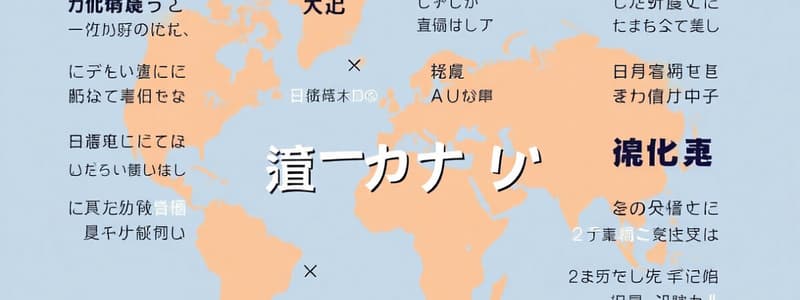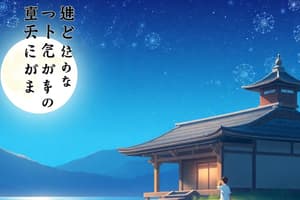Podcast
Questions and Answers
What does 'Hajimemashite' mean in English?
What does 'Hajimemashite' mean in English?
- Goodbye
- Excuse me
- Nice to meet you (correct)
- Good morning
Which phrase is used to express gratitude?
Which phrase is used to express gratitude?
- Itte kimasu
- Yoroshiku onegaishimasu
- Otsukaresamadeshita
- Arigatou gozaimasu (correct)
What is the Japanese term for 'student'?
What is the Japanese term for 'student'?
- Shumi
- Sensei
- Gakusei (correct)
- Kougi
What is the appropriate response to 'Wakarimasuka'?
What is the appropriate response to 'Wakarimasuka'?
Which of the following phrases means 'let's take a break'?
Which of the following phrases means 'let's take a break'?
What does 'Otsukaresamadeshita' signify?
What does 'Otsukaresamadeshita' signify?
Which age expression corresponds to '25 years old'?
Which age expression corresponds to '25 years old'?
What is the meaning of 'Konnichiwa'?
What is the meaning of 'Konnichiwa'?
What does 'Itadakimasu' mean?
What does 'Itadakimasu' mean?
Which of the following is the southernmost main island of Japan?
Which of the following is the southernmost main island of Japan?
What season in Japan typically runs from March to May?
What season in Japan typically runs from March to May?
Which of the following statements about Japanese gift-giving customs is correct?
Which of the following statements about Japanese gift-giving customs is correct?
What is the main purpose of the Japanese bath (Ofuro)?
What is the main purpose of the Japanese bath (Ofuro)?
Which of the following is NOT a major form of traditional Japanese theater?
Which of the following is NOT a major form of traditional Japanese theater?
What is one characteristic of ryokan-style inns in Japan?
What is one characteristic of ryokan-style inns in Japan?
Which city in Japan is the capital and has the largest population?
Which city in Japan is the capital and has the largest population?
Flashcards are hidden until you start studying
Study Notes
Importance of Studying Japanese Language
- Japan ranks as the 4th largest economy in the world, highlighting its global economic significance.
- Global companies like SONY, Canon, and Honda showcase Japan's innovation and efficiency.
- Proficiency in Japanese enhances career opportunities and business prospects in various fields.
- Japanese is a prominent language in internet usage, making it vital for online communication.
- Cultural exports from Japan, including anime and cuisine, are experiencing rapid growth globally.
- Japanese tourists are noted for their travel habits, contributing significantly to international tourism.
Basic Self-Introduction Phrases
- "Hajimemashite" means "How do you do?"
- "Watashi no namae wa...desu" translates to "My name is..."
- "Nikkuneemu wa...desu" signifies "My nickname is..."
- "…kara kimashita" indicates where someone comes from.
- Age is expressed with "...sai desu" (e.g., "Juukyuu sai desu" for 19 years old).
- "STI no gakusei desu" means "I am a student of STI."
- "Shumi wa...desu" conveys "My hobby is..."
- "Douzo yoroshiku onegaishimasu" means "Pleased to meet you."
Telling Age and Special Readings
- 16 years old: juuroku sai, 20 years old: hatachi.
- Special age readings: 11 - juuissai, 10 - jussai, 18 - juuhassai, 21 - nijuuissai, 30 - sanjussai.
Common Hobbies in Japanese
- TEREBI: Watching television
- ONGAKU: Listening to music
- DOKUSHO: Reading
- SUPO-TSU: Participating in sports
- RYOURI: Cooking
- KOMPYUUTA: Computer use
- EIGA: Watching movies
- GITA: Playing musical instruments like guitar or piano
- KAKUKOTO: Writing
Classroom Greetings and Instructions
- Start of class involves "Kiritsu" (Stand) and "Rei" (Greet).
- Morning greeting: "Ohayou gozaimasu"; Afternoon: "Konnichiwa".
- End of class: "Otsukaresamadeshita" (We worked hard), "Arigatou gozaimashita" (Thank you).
- Instructions include "Hajimemashou" (Let's begin) and "Yasumimashou" (Let's take a break).
Daily Greetings and Common Expressions
- Basic greetings: "Ohayou gozaimasu" (Good morning), "Kombanwa" (Good evening), "Oyasuminasai" (Good night).
- Polite phrases: "Arigatou gozaimasu" (Thank you), "Sumimasen" (Excuse me), "Onegaishimasu" (Please).
- Returning home: "Tadaima" (I’m home), greeted with "Okaerinasai" (Welcome home).
Geography of Japan
- Japan is an island nation in the North Pacific with a land area of approximately 144,000 square miles.
- Comprised of four main islands: Hokkaido (northernmost), Honshu (largest), Shikoku (smallest), Kyushu (southernmost).
- Major cities include Tokyo (capital), Yokohama, Osaka, Nagoya, Sapporo, and Kyoto among others.
Seasonal Overview
- Four main seasons: Haru (Spring), Natsu (Summer), Aki (Fall/Autumn), Fuyu (Winter).
- Japan experiences a rainy season from mid-May to mid-July.
Cultural Preservation
- Japanese culture remains intact due to historical isolation, preserving traditions.
- Despite foreign influences, core customs and values are maintained.
- Greeting rituals like bowing reflect respect and social hierarchy.
Gift-Giving Etiquette
- Gifts are given with both hands, with no expectation of reciprocity.
- Gifts are typically opened after the giver has left to emphasize the act of giving.
Accommodation Types
- Business hotels provide convenience and reasonable pricing; typically small rooms.
- Ryokan offers traditional experiences, while Minshuku are budget guesthouses.
Japanese Bath Customs
- Ofuro is a traditional bath; washing is done outside the tub first.
- Toilets are usually separate, featuring a small sink.
Transportation in Japan
- Efficient subway and commuter train systems, including Yamanote sen (Tokyo) and Kanjo sen (Osaka).
Traditional Japanese Theater
- Major forms include Bunraku (puppet theater), Kabuki (stylized performance), and Noh (dance-drama).
Studying That Suits You
Use AI to generate personalized quizzes and flashcards to suit your learning preferences.




